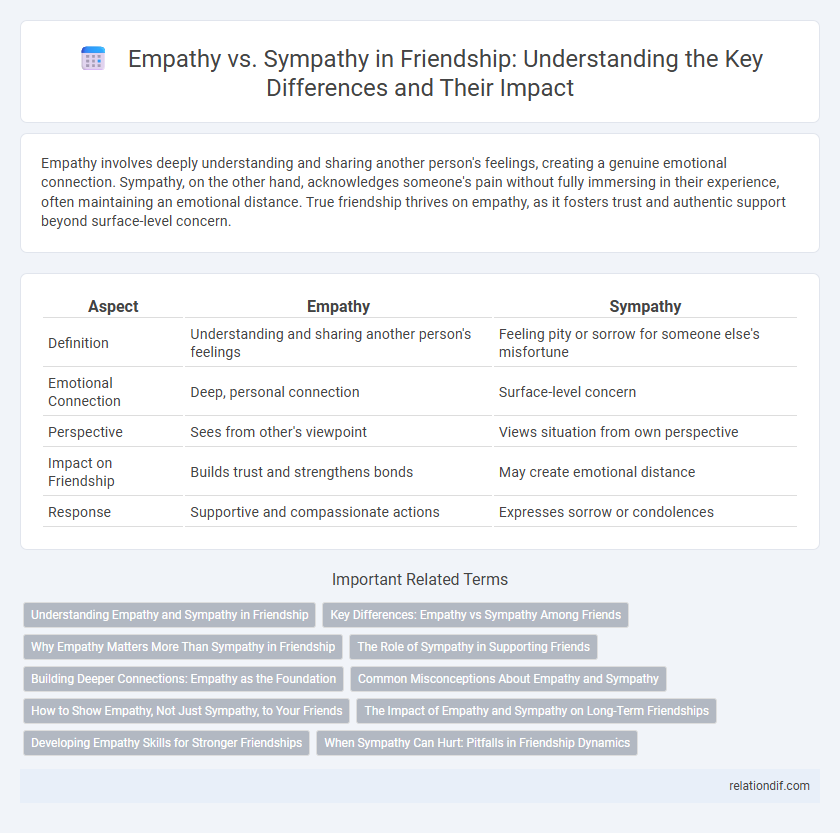Empathy involves deeply understanding and sharing another person's feelings, creating a genuine emotional connection. Sympathy, on the other hand, acknowledges someone's pain without fully immersing in their experience, often maintaining an emotional distance. True friendship thrives on empathy, as it fosters trust and authentic support beyond surface-level concern.
Table of Comparison
| Aspect | Empathy | Sympathy |
|---|---|---|
| Definition | Understanding and sharing another person's feelings | Feeling pity or sorrow for someone else's misfortune |
| Emotional Connection | Deep, personal connection | Surface-level concern |
| Perspective | Sees from other's viewpoint | Views situation from own perspective |
| Impact on Friendship | Builds trust and strengthens bonds | May create emotional distance |
| Response | Supportive and compassionate actions | Expresses sorrow or condolences |
Understanding Empathy and Sympathy in Friendship
Empathy in friendship involves deeply sharing and understanding a friend's emotions, fostering genuine connection and support. Sympathy, by contrast, means recognizing a friend's feelings without fully experiencing them, which can create emotional distance. Developing empathy strengthens trust and emotional bonds, making friendships more resilient and meaningful.
Key Differences: Empathy vs Sympathy Among Friends
Empathy among friends involves deeply understanding and sharing each other's emotions, creating a stronger emotional bond through genuine connection. Sympathy is recognizing another's feelings and expressing concern, often from a more detached perspective. Empathy fosters trust and support by validating experiences, while sympathy may offer comfort without fully engaging with the friend's emotional state.
Why Empathy Matters More Than Sympathy in Friendship
Empathy matters more than sympathy in friendship because it fosters genuine understanding and emotional connection by allowing one to feel and share another's experiences rather than merely acknowledging them. This deep emotional resonance strengthens trust and support, essential for enduring relationships. Friends who practice empathy create safe spaces for vulnerability, promoting healing and growth beyond superficial comfort.
The Role of Sympathy in Supporting Friends
Sympathy plays a crucial role in supporting friends by allowing individuals to express genuine concern and offer comfort during difficult times. It involves acknowledging a friend's emotions and validating their experiences without necessarily sharing the same feelings, which fosters trust and emotional safety. This compassionate response helps strengthen friendships by creating an environment where friends feel understood and cared for.
Building Deeper Connections: Empathy as the Foundation
Empathy fosters deeper connections in friendship by enabling individuals to truly understand and share each other's emotions, creating a strong foundation of trust and mutual respect. Unlike sympathy, which often maintains emotional distance, empathy encourages active listening and authentic emotional engagement, strengthening relational bonds. This profound emotional resonance enhances communication and promotes long-lasting, meaningful friendships.
Common Misconceptions About Empathy and Sympathy
Many people mistakenly believe empathy and sympathy are interchangeable, but empathy involves truly understanding and sharing another person's feelings, while sympathy is feeling pity or sorrow for their situation. Empathy requires emotional engagement and perspective-taking, whereas sympathy maintains emotional distance. Confusing the two can hinder genuine connection and support in friendships.
How to Show Empathy, Not Just Sympathy, to Your Friends
Showing empathy to your friends involves actively listening and validating their feelings rather than offering simple sympathy or pity. Use reflective statements and open-ended questions to demonstrate understanding and create a safe space for emotional expression. Prioritize being present and genuinely connecting with their experiences to build deeper, more supportive friendships.
The Impact of Empathy and Sympathy on Long-Term Friendships
Empathy fosters deeper understanding and emotional connection by allowing friends to genuinely share and relate to each other's feelings, which strengthens trust and intimacy in long-term relationships. Sympathy, while expressing concern and care, often creates a degree of emotional distance that may limit authentic communication and mutual support over time. Prioritizing empathy in friendships enhances resilience, promotes healing during conflicts, and cultivates enduring loyalty.
Developing Empathy Skills for Stronger Friendships
Developing empathy skills strengthens friendships by enabling individuals to genuinely understand and share others' feelings, fostering deeper emotional connections. Active listening, non-judgmental responses, and perspective-taking are key techniques that enhance empathy. These skills promote trust and support, making friendships more resilient and fulfilling.
When Sympathy Can Hurt: Pitfalls in Friendship Dynamics
Sympathy often creates emotional distance by emphasizing feelings of pity rather than understanding, which can alienate friends in need. Expressing empathy, characterized by deeply connecting with a friend's emotions without judgment, fosters trust and meaningful support. Misplaced sympathy risks invalidating genuine experiences and may hinder open communication, ultimately damaging the friendship's foundation.
Empathy vs Sympathy Infographic

 relationdif.com
relationdif.com